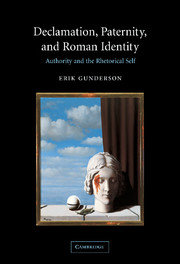Book contents
- Frontmatter
- Contents
- Preface: Acheron
- Introduction: A praise of folly
- PART I WHERE EGO WAS …
- 1 Recalling declamation
- 2 Fathers and sons; bodies and pieces
- 3 Living declamation
- 4 Raving among the insane
- PART II LET ID BE
- By way of conclusion
- Appendix 1 Further reading
- Appendix 2 Sample declamations
- List of references
- Index locorum
- General index
1 - Recalling declamation
Published online by Cambridge University Press: 10 December 2009
- Frontmatter
- Contents
- Preface: Acheron
- Introduction: A praise of folly
- PART I WHERE EGO WAS …
- 1 Recalling declamation
- 2 Fathers and sons; bodies and pieces
- 3 Living declamation
- 4 Raving among the insane
- PART II LET ID BE
- By way of conclusion
- Appendix 1 Further reading
- Appendix 2 Sample declamations
- List of references
- Index locorum
- General index
Summary
He who appeals to authority when there is a difference of opinion works with his memory rather than with his reason.
Leonardo da VinciThe Elder Seneca opens his collection of reminiscences of declamation with a preface dedicated in large measure to the theme of memory itself. The prominence of memory in Seneca's preface has attracted a variety of commentary. Some marvel at the miracle (miraculum) but then grow swiftly suspect. Others admire and defend. Most agree that Seneca is not to be taken literally at his word. Rather than seeing in memory the tool that excavates the trove of citations that Seneca shall shortly offer, let us take it instead as a theme of the text. If memory is a tool, it works as a trope, not as a simple mechanism for retrieving information. Seneca works with his memory and in so doing he makes an appeal to an authority now lost, but one that he hopes to recover. Seneca's text is thus not a necessarily a “reasonable” one, as Leonardo might have it, but it remains nevertheless a purposeful one: both the memory of rhetoric and the rhetoric of memory conspire to reproduce masculine authority.
Accordingly I wish to examine what is at stake in writing down Seneca's memories. We will not find a mere collection of random scraps, but instead an argument as to the proper economy of rhetoric. And this argument is specifically a declamatory argument.
- Type
- Chapter
- Information
- Declamation, Paternity, and Roman IdentityAuthority and the Rhetorical Self, pp. 29 - 58Publisher: Cambridge University PressPrint publication year: 2003



